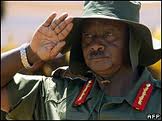USA thinks Museveni is ‘deluded and autocratic’
By Timothy Nsubuga
13th Dec 2010
The United States of America [USA] is convinced that President Yoweri Museveni is deluded and autocratic, the controversial WikiLeaks diplomatic cables revealed.
According to the leaked diplomatic cables, US Ambassador to Uganda Jerry Lanier on 19th October 2009 prepared a briefing document titled “Scene-setter” for Assistant Secretary of State for Africa Jonnie Carson who was due to visit Uganda.
Museveni has autocratic tendencies:
In the briefing paper, Ambassador Lanier told Secretary Carson that “…the President’s autocratic tendencies, as well as Uganda’s pervasive corruption, sharpening ethnic divisions, and explosive population growth have eroded Uganda’s status as an African success story”.
Ambassador Lanier further added that “…holding a credible and peaceful presidential election in February 2011 could restore Uganda’s image, while failing in that task could lead to domestic political violence and regional instability”.
While acknowledging some successes made by Museveni’s government, Ambassador Lanier also said “…Museveni and the NRM have not fully embraced multiparty politics or allowed meaningful political alternatives. They are now more entrenched in government and state institutions than during the days of his “no-party” system”.
Absolute power corrupts absolutely:
In a veiled reference to the old maxim which states that “absolute power corrupts absolutely”, Ambassador Lanier said “…the NRM’s near total accumulation of power has led to poor governance, corruption, and rising ethnic tensions; a combination that threatens Ugandan “democracy” and stability”.
Post-election violence is now inevitable:
Ambassador Lanier also said whereas the opposition parties in the IPC coalition are “…demanding the dissolution of the partisan Electoral Commission constituted by Museveni, and the acceptance of specific electoral reforms…Museveni now appears unlikely to yield on either count. Opposition parties and the government seem destined for another turbulent showdown as elections approach in early 2011”.
The US diplomat further said that even if the President begins now to make good faith efforts to hold free and fair elections, he still may be unable to prevent serious, even stability threatening violence around the 2011 elections.
The opposition, he said, “…is privately threatening violence and it is difficult to discern what the President could do now that would satisfy the political desires of so many who have been excluded from politics for so long”.
Museveni is a ‘heavy-handed’ President:
Confirming what many Ugandans, and especially opposition activists already knew, Ambassador Lanier told Secretary Carson that “…Museveni’s heavy-handedness and the corruption of senior leaders have sparked dissent within the NRM”.
He also said a group of NRM “rebels”, mostly back-bench MPs, support opposition demands for an impartial Electoral Commission. These “rebels”, Ambassador Lanier says, “…is critical of Museveni’s unwillingness to hold senior NRM leaders – such as Security Minister Mbabazi, Foreign Minister Kutesa, and Trade Minister Otafiire among others – accountable for corruption allegations”.
Is Museveni now a ‘deluded’ President?
In what has been interpreted by one analyst who is familiar with ‘diplomatic speak’ to be the most damning indictment of “Museveni the man”, Ambassador Lanier added that both “…press reports and anecdotal evidence suggest the President is increasingly isolated and unaware of the depth of resentment both within the NRM and among society as a whole”.
That, according to this analyst, who is a retired US based Ugandan scholar of Political Science, means “…the US government under President Barack Obama now privately believes Museveni is a deluded President”.
No credible elections, No American support:
In what seemed like a policy advice to the US State Department, Ambassador Lanier warned that “…failure in this area [meaning conducting free and fair elections] could…make it more difficult for the U.S. to continue as a strong security partner”.
For credible elections to take place, Ambassador Lanier said, “…Museveni must address the perceived partisanship of the Electoral Commission and make meaningful electoral reform within the next four months”.
Human Rights Abuses:
On the subject of human rights, again, while acknowledging that some progress has been made since the days of Idi Amin’s dictatorship, Ambassador Lanier still maintained that “…there remains numerous, credible allegations of unlawful detention and torture by the Joint Ant-Terrorism Taskforce (JATT), the Chieftaincy of Military Intelligence (CMI), the police’s Rapid Response Unit (RRU), and other para-military outfits”.
These allegations, he said, severely undermine progress in other areas. The US diplomat concluded his assessment of Uganda’s human rights situation under President by saying that overall, “…it is clear that neither the law enforcement institutions nor the judiciary are capable of restraining government excesses in either corruption or abuse of human rights”.
Museveni lacks political will to fight corruption:
On the unprecedented corruption in Museveni’s Uganda, the US diplomat felt there was no need to be diplomatic about it. So he told it exactly as it is: “…Uganda’s anti-corruption record is not impressive”, Ambassador Lanier said.
He noted that the Millennium Challenge Corporation (MCC) initiated a threshold program to combat corruption but cancelled it for 2010 “…due to lack of political will at the highest levels of the government. Impunity at high levels of government continues, diminishing trust in the regime and the public’s faith in democracy. The President must lead from the top and hold senior leaders accountable when there is credible evidence of corruption”, Ambassador Lanier stressed.
How Museveni sacrificed UPDF lives to win US support:
Confirming what one analyst told Uganda Correspondent several months ago, President Museveni’s insistence on deploying UPDF soldiers [with 45 of them killed so far] to Somalia at all costs, including an opposition walk-out from parliament, was designed to win back the US support that he had lost.
“…Uganda’s commitment to AMISOM…has made Uganda one of our primary partners in the fight against terrorism. We stand shoulder-to-shoulder with AMISOM and will continue to support the UPDF’s deployment in Mogadishu”, the US diplomat said.
He also said the US was ready to discuss how it can support and equip future UPDF deployments to Somalia. END. Please log into www.ugandacorrespondent.com every Monday to read our top stories and anytime mid-week for our news updates.
![]()


